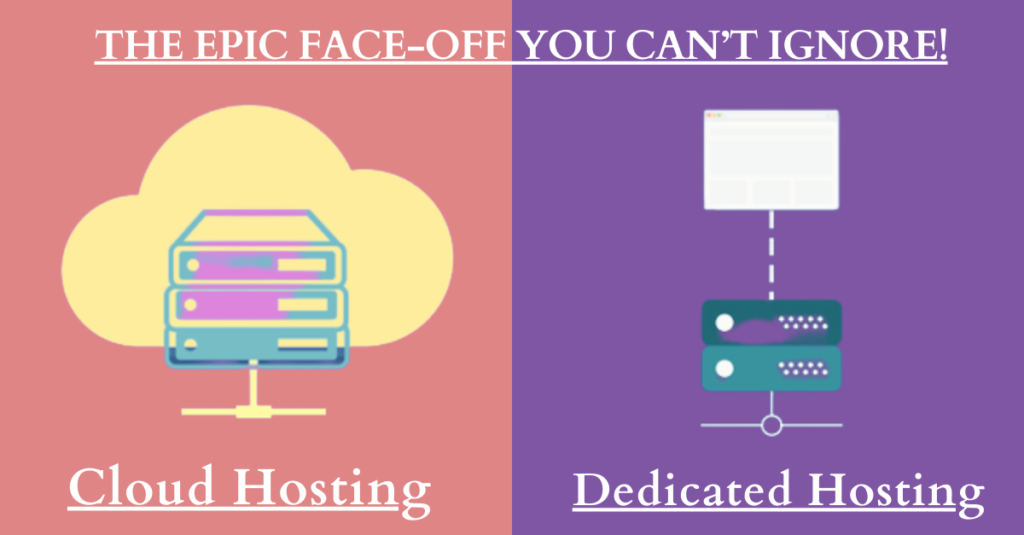Cloud Hosting vs Dedicated Hosting: The Epic Face-Off You Can’t Ignore!
Introduction
In the relentless quest for digital dominance, the battle lines have been drawn between two heavyweight contenders: Cloud Hosting and Dedicated Hosting. In our digital age, where online presence can make or break businesses, the choice between these hosting behemoths holds unparalleled significance. Welcome to the ultimate showdown – “Cloud Hosting vs Dedicated Hosting: The Epic Face-Off You Can’t Ignore!”
Cloud Hosting harnesses the power of virtualization, promising unmatched scalability and cost-efficiency. On the other side of the ring, Dedicated Hosting boasts the raw might of physical servers, guaranteeing unparalleled performance and control. As these titans clash, questions arise. Which solution delivers the knockout performance for your website or application? Is the flexibility of the cloud enough to take down the unyielding strength of dedicated resources?
Join us as we dissect the merits and drawbacks, uncover hidden gems, and guide you through this high-stakes duel. The battle lines are drawn, the contenders are ready – let the face-off begin!
Cloud Hosting vs Dedicated Hosting: The Epic Face-Off You Can’t Ignore!
Cloud Hosting: The Dynamic Powerhouse

Cloud Hosting, often hailed as the epitome of modern hosting solutions, leverages the prowess of virtualization to provide businesses with an unprecedented level of scalability, flexibility, and cost-efficiency. In the cloud realm, your website or application isn’t confined to a single physical server; instead, it draws resources from a vast network of interconnected virtual servers. This means that as your traffic surges or fluctuates, your hosting environment can seamlessly adapt, ensuring a smooth user experience.
One of the most compelling aspects of Cloud Hosting is its elasticity. Imagine your website suddenly experiences a surge in traffic due to a viral post or a seasonal promotion. With Cloud Hosting, your resources automatically scale up to accommodate the increased demand, preventing dreaded crashes and slowdowns. This dynamic nature translates to cost savings too, as you only pay for the resources you actually use, making it an attractive option for startups and businesses with varying workloads.
Moreover, Cloud Hosting introduces redundancy and reliability to the equation. Your data is mirrored across multiple servers, minimizing the risk of catastrophic data loss. Even if a server fails, your website can continue to operate seamlessly from another server in the network. This level of fault tolerance can give you peace of mind, knowing that your online presence is in safe hands.
The Challenges of Cloud Hosting
While Cloud Hosting’s advantages are alluring, it’s not without its challenges. Security concerns loom over the cloud due to its shared nature. Although cloud providers implement robust security measures, the “shared server” concept can lead to potential breaches if a neighboring account is compromised. Additionally, relying on internet connectivity means that your website’s performance is tied to your internet connection speed. This dependence could lead to accessibility issues if your internet service provider experiences downtime.
Furthermore, Cloud Hosting might not be the optimal choice for applications with strict compliance requirements or those that demand fine-tuned server configurations. The virtualized environment, while flexible, might lack the customization and control needed for specialized applications.
Dedicated Hosting: The Unwavering Force

In the opposing corner stands Dedicated Hosting, a heavyweight champion known for its raw power and control. With this solution, your website or application resides on a dedicated physical server, exclusively allocated to you. This exclusivity translates to consistent performance, as you’re not competing for resources with other users.
Dedicated Hosting shines when performance is non-negotiable. Resource-intensive applications, high-traffic websites, and e-commerce platforms can benefit immensely from the dedicated hardware at their disposal. The absence of resource-sharing ensures that your website maintains peak performance even during traffic spikes.
Moreover, Dedicated Hosting hands you the reins of customization. You have full control over the server’s configuration, software installations, and security measures. This level of control is ideal for tech-savvy users who want to tailor their hosting environment to meet specific requirements.
The Challenges of Dedicated Hosting
However, the power of Dedicated Hosting comes at a cost – both figuratively and literally. Dedicated servers tend to be more expensive than their cloud counterparts, making them less appealing to small businesses or startups with tight budgets. Additionally, while Dedicated Hosting offers stability, it lacks the inherent scalability of Cloud Hosting. Scaling up in Dedicated Hosting often involves physical upgrades, leading to potential downtime during the process.
Another consideration is the responsibility of server management. Unlike Cloud Hosting, where much of the infrastructure management is handled by the provider, Dedicated Hosting places the onus on you to handle maintenance, security updates, and other technical aspects. This might require a certain level of expertise or the hiring of IT professionals.
The Verdict: Choosing Your Champion
When it comes to selecting between Cloud Hosting and Dedicated Hosting, there’s no one-size-fits-all answer. Your decision should hinge on your specific needs, resources, and long-term goals.
If your priority is dynamic scalability, cost-efficiency, and flexibility, Cloud Hosting emerges as a strong contender. It suits businesses that anticipate varying workloads and those looking to scale without significant upfront investments. Startups, bloggers, and smaller websites can benefit from the pay-as-you-go model.
On the other hand, if your website demands unswerving performance, absolute control over server configuration, and the ability to handle resource-intensive tasks, Dedicated Hosting remains an unrivaled choice. Larger enterprises, high-traffic e-commerce sites, and applications with specific compliance requirements might find Dedicated Hosting their ideal match.
For some, a middle ground might be the solution. Hybrid Hosting, a blend of Cloud and Dedicated Hosting, allows you to enjoy the best of both worlds. You can offload peak traffic to the cloud while relying on dedicated servers for mission-critical tasks.
Conclusion: The Battle Continues
In the end, the epic face-off between Cloud Hosting and Dedicated Hosting reveals a nuanced landscape where each contender boasts unique strengths and challenges. The choice isn’t just about technology; it’s about aligning your hosting choice with your project’s goals, size, and budget. As technology evolves, so do these hosting solutions – making it essential to stay informed about emerging trends and changes in the hosting ecosystem. In this ever-evolving digital arena, the battle between Cloud Hosting and Dedicated Hosting continues to captivate, and the ultimate victor is the one that meets your website’s needs with unparalleled precision.

My name is Rohit Vagh and I’m a content writer specializing in fashion and lifestyle. I have three years of experience in this field and have written various articles. My writing style is creative and engaging, and I strive to create content that resonates with my readers. I have a deep passion for fashion and am constantly researching the latest trends and styles to make sure my readers are up to date. I’m excited to continue my career in blogging, and I’m always looking for new opportunities in the fashion and lifestyle space.





